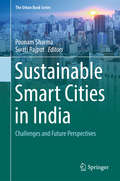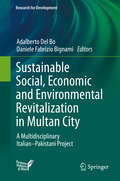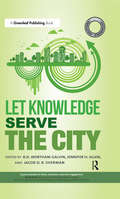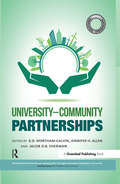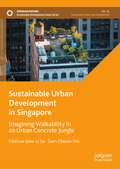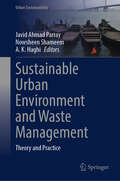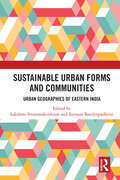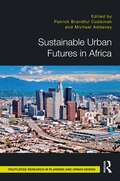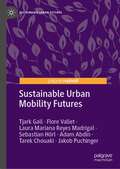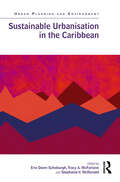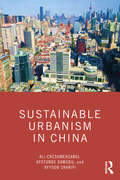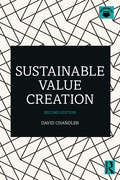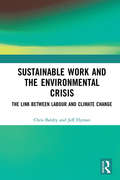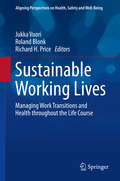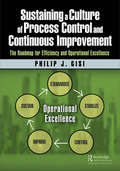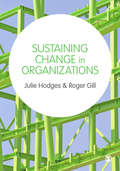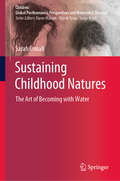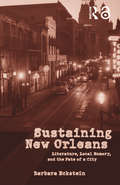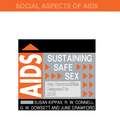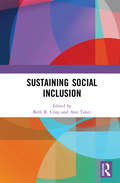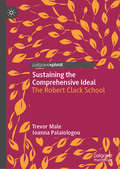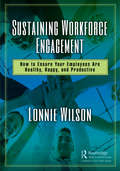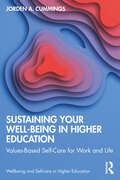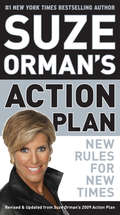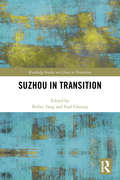- Table View
- List View
Sustainable Smart Cities in India
by Poonam Sharma Swati RajputThis book presents fundamental and applied research aimed at the development of smart cities across India. Based on the exploration of an extensive array of multidisciplinary literature, this book discusses critical factors of smart city initiatives: management and organization, technology, governance, policy, people and communities, economy, infrastructure, and natural environment. These factors are broadly covered under the integrative framework of the book to examine the vision and challenges of smart city initiatives. The book suggests directions and agendas for smart city research and outlines practical implications for government professionals, students, research scholars and policy makers. A lot of work is happening on smart cities as it is an upcoming area of research and development. At international level, and even in India, the concept of smart cities concept is a hot topic at universities, research centers, ministries, transport departments, civic bodies, environment, energy and disaster organizations, town planners and policy makers. This book provides ideas and information to government officials, investors, experts and research students.
Sustainable Social, Economic and Environmental Revitalization in Multan City
by Adalberto Del Bo Daniele Fabrizio BignamiThis book describes six months of initial intensive activities within a motivating multidisciplinary project to achieve sustainable social, economic, and environmental revitalization in the historic core of Multan City, Pakistan. The project is managed by Fondazione Politecnico di Milano within the framework of the "Pakistan-Italian Debt for Development Swap Agreement" and has five components: a livelihood improvement program, a living conditions improvement program, revitalization of physical assets, establishment of a Pakistan-Italian resource centre in Multan, and an Italian collaboration program for training and capacity building. All aspects are covered in this book, which provides a comprehensive account of progress in this excellent example of cross-cultural cooperation between a Western and an Eastern country in regenerating an historic populated site.
Sustainable Solutions: Let Knowledge Serve the City
by B.D. Wortham-Galvin Jennifer H. Allen Jacob D.B. ShermanPortland, Oregon. Sustainability might not seem glamourous, but Portland is making a name for itself as one of the most sustainable cities in the world. Whether you’ve heard about the farmers’ markets, the cycle-friendly streets or the ongoing efforts to balance livability and equity, Portland is leading the way in urban sustainability: this book helps us understand how it achieves this.A critical component of Portland’s success is collaboration between different communities and institutions; the Sustainable Solutions series examines higher education’s role in these partnerships. In exploring how best to “let knowledge serve the city”, Portland State University translates its founding motto from mere words to applied research and action.This first volume examines different approaches to collaborative work that PSU has taken, both within the university and with community partners: how have barriers been overcome between different areas of study, between academia and the public, and why is bridging these divides so important? It also introduces the themes of the engaged university, social justice, climate change and sustainable economic development, which shape PSU’s work.Let Knowledge Serve the City is ideal for anyone seeking best practice in connecting students and universities with the needs of local communities. From public interest design and student leadership, to food justice and age-friendly development, authors combine academically rigorous theories of sustainability and community-university partnerships with lessons learned on how to realize ideals of sustainable development.
Sustainable Solutions: University–Community Partnerships (Sustainable Solutions Ser. #2)
by B.D. Wortham-Galvin Jennifer H. Allen Jacob D.B. ShermanWhat is the role of the university? Current systems may stress research output, but Wortham-Galvin, Allen, and Sherman seek to re-establish the importance of teaching and service in the work of the 21st-century university. The Sustainable Solutions series shares Portland State University’s experience of community-engaged teaching and research. With a focus on sustainability, we see that such collaboration is vital to making Portland one of the world’s most sustainable cities.Volume 2, University–Community Partnerships, builds on the themes introduced in Volume 1, Let Knowledge Serve the City, to explore how these partnerships play out in practice. Covering 13 projects, which range from supporting local artisans and researching food access, to sharing Indigenous history and decolonizing perceptions of knowledge, readers receive pragmatic advice on working with community organizations. Authors also offer critical reflection on how theories of engagement have structured PSU’s work and how their findings impact our very understanding of partnership.This reader-friendly text provides an ideal introduction to anyone wishing to learn more about models of effective collaboration and how to put these into practice. Explained through the context of specific projects, the book offers both inspiration and practical guidance to anyone — in local government, academia, or the third sector — looking to set up productive community–university partnerships.
Sustainable Urban Development in Singapore: Imagining Walkability in an Urban Concrete Jungle (Sustainable Development Goals Series)
by Melissa Liow Li Sa Sam Choon-YinThis book offers theoretical and practical insights into land use, transport, and national policies in one of world’s well-known urban concrete jungle, none other than the Singapore city. The emphasis is situated on Singapore’s attempt to promote walking and cycling. Greater appreciation of walkability thrives on Singapore’s rich history, green city, people and the gastronomic kopitiam and hawker culture. The book offers a comprehensive coverage of walkability as a crucial component of urban design to reduce vehicular congestion with the associated carbon emissions, foster a healthy lifestyle and community participation and create jobs to help the economy. A high income per capita and an aging society, lessons drawn from Singapore’s experience will be useful to other societies. Scholars in sustainable tourism field, urban planners, government bodies, tourist boards, entrepreneurs, national parks board, residents, and inbound travellers will benefit from reading the book.
Sustainable Urban Environment and Waste Management: Theory and Practice (Urban Sustainability)
by Javid Ahmad Parray Nowsheen Shameem A. K. HaghiThis very unique research-oriented edited collection introduces waste and pollution treatment methods that can be adopted at local and international levels and examines appropriate resource management strategies for environmentally related issues. It aims to highlight the important role of education for environmental sustainability, in particular the area of urban waste management. Presenting the latest research topics innovative ideas to educate future citizens regarding sustainable development of our planet, it is of interest to readers who are involved in education, policy, science, and technological innovation for urban waste management. Education and awareness in the field of waste management is significantly important from a global perspective of resource management. The aim of this edited collection is creating an interdisciplinary platform for researchers and practitioners to present and discuss the most recent innovations, trends, and concerns as well as practical challenges encountered and solutions adopted in the fields of Environmental Science. This new book explores the crucial nexus between innovative solutions for waste management, and environmental sustainability in an edited collection. This comprehensive book provides a holistic investigation of the most recent inventions, advancements, and breakthroughs in waste management as the need for solutions to the environmental pollution problem becomes more urgent on a global scale. The book investigates the diverse environmental effect of environmental pollution and emphasizes how urgent it is to resolve the ecological costs of waste contamination.
Sustainable Urban Forms and Communities: Urban Geographies of Eastern India
by Sumana Bandyopadhyay Lakshmi SivaramakrishnanThis volume discusses the patterns and trends of urbanization in West Bengal - one of the most urbanized states of India in the early part of the 20th Century. It focuses on the emerging urban landscapes of the state and neighbouring areas on building sustainable urban units and sustainable communities. The book explores the changing urban geographies of the emerging towns of the state and discusses how proper governance can help them to change into sustainable urban units. It presents the historical context of urbanization of West Bengal and traces the factors responsible for the urban primacy of the state. It discusses topics such as the development of the spatial patterns and urbanization, spatial trends of urban growth using remote sensing and GIS techniques, well-being and resilience in the urban society, impact of urbanization on the health status of its citizens, and decentralized governance for inclusive and sustainable development of cities. It also focuses on urban growth, land-use change and its impact on the urban environment. Based on empirical research, this book will be useful for students, teachers and researchers of geography, urban geography, urban studies, urban development and planning, regional planning urban sociology, politics, and urban economics. It will also be of interest to geographers, urban planners, community of geographers, professionals engaged in the discipline, and those interested in the urban geography of West Bengal and eastern India.
Sustainable Urban Futures in Africa
by Patrick Brandful CobbinahSustainable Urban Futures in Africa provides a variety of conventional and emerging theoretical frameworks to inform understandings and responses to critical urban development issues such as urbanisation, climate change, housing/slum, informality, urban sprawl, urban ecosystem services and urban poverty, among others, within the context of the sustainable development goals (SDGs) in Africa. This book addresses topics including challenges to spatial urban development, how spatial planning is delivered, how different urbanisation variables influence the development of different forms of urban systems and settlements in Africa, how city authorities could use old and new methods of land administration to produce sustainable urban spaces in Africa, and the role of local activism is causing important changes in the built environment. Chapters are written by a diverse range of African scholars and practitioners in urban planning and policy design, environmental science and policy, sociology, agriculture, natural resources management, environmental law, and politics. Urban Africa has huge resource potential – both human and natural resources – that can stimulate sustainable development when effectively harnessed. Sustainable Urban Futures in Africa provides support for the SDGs in urban Africa and will be of interest to students and researchers, professionals and policymakers, and readers of urban studies, spatial planning, geography, governance, and other social sciences.
Sustainable Urban Mobility Futures (Sustainable Urban Futures)
by Tjark Gall Flore Vallet Laura Reyes Madrigal Sebastian Hörl Adam Abdin Tarek Chouaki Jakob PuchingerThis book provides a unique perspective on urban mobility focusing on past challenges and future trends. The book enables discussions of pathways towards sustainable and people-centred urban mobility building on existing concepts and introducing novel methods and consideration of future research. In particular, the book provides an overview of trends, design methods, and projects combining foresight and agent-based modelling to better integrate active mobility in Mobility-as-a-Service, assess impacts of automated vehicles in Paris, and compare multiple solutions in Cairo. The book provides a range of multidisciplinary concepts and methods that will be invaluable to both researchers in the field and students taking relevant courses.
Sustainable Urbanisation in the Caribbean (ISSN)
by Stephanie V. McDonald Dawn Schoburgh, Edited by ErisSustainable Urbanisation in the Caribbean critically examines the socio-geographic context of island states, prioritising the nuanced experiences of Caribbean island states and territories that are largely considered small island developing states (SIDS), against the backdrop of the UN Sustainable Development Goals (SDGs).Increases in urban density place enormous pressure on existing infrastructures and natural resources, exacerbating social inequalities and environmental risks. While the UN SDGs aim to mitigate these risks, the reality of implementing these goals in the context of SIDS is complex. Whereas Sustainable Urbanisation in the Caribbean does not claim to be a comprehensive assessment of policy responses to the SDGs, this edited volume seeks to generate problem-focused, policy-relevant, demand-driven research, thereby permitting the geographical contexts of island states to contribute to the development of proper causal theory about sustainable urbanisation.This book will be of interest to students of public policy, urban sustainability and climate change, as well as government policy analysts, development practitioners, urban planners and UN agencies working in SIDS.
Sustainable Urbanism in China
by Ali Cheshmehzangi Ayotunde Dawodu Ayyoob SharifiSustainable Urbanism in China explores the notion of "Sustainable Urbanism" by considering the role sustainable neighborhood planning plays in the larger picture of sustainable urbanism and suggests innovations and best practices that are either developed or adopted by China. These are narrated as lessons learnt for other countries where we see similar trends of development patterns or emerging practices. Through various explorations of challenges, paradigms, and innovations of urban sustainability, this book highlights how planning, policy, and design are forming and reforming in the context of China. These are offered through a set of guidelines and pathways for urban sustainability at the scale of neighborhoods/communities or districts in a wider context of urban environments, as well as strategies for planners, developers, policy makers, and educators in the field of the built environment. Through a comprehensive overview of urban sustainability practices in China, this book investigates 12 case study projects. These comprehensive explorations should in turn help construct the future directions of China’s sustainable urban development and provide innovative pathways of sustainable urbanism in China and around the globe.
Sustainable Value Creation: Stakeholders, Globalization, And Sustainable Value Creation
by David ChandlerThe framework presented in this book, Sustainable Value Creation, is the result of more than twenty years thinking and writing at the intersection of two subjects, strategy and CSR. I teach strategy and I think about CSR, almost constantly. Given my academic home in the business school, I appreciate the importance of markets and the ability of their essential actors (for-profit firms) to create value. Equally, of course, I see the ability of firms to destroy value, on an all-too-frequent basis. As such, I have spent a lot of time thinking about how to promote the beneficial work firms do and eradicate the harm. The result is this book: a framework through which managers can understand the essential purpose of the for-profit firm, the most powerful entity we have devised to drive societal progress. At its core, this book is structured around the ten principles that define Sustainable Value Creation. The foundation for these principles is a pragmatic philosophy, oriented around stakeholder theory and designed to appeal to managers skeptical of existing definitions of CSR, sustainability, or business ethics. It is also designed to stimulate thought within the community of academics committed to these ideas, but who approach them from more traditional perspectives. Ultimately, therefore, this book aims to reform both business practice and business education. By building a theory that redefines CSR as central to everything the firm does (as opposed to peripheral practices that can be marginalized), these ten principles redefine how firms approach each of their operational functions, but also how these subjects should be taught in universities worldwide. As such, this book will hopefully be of value to instructors as a complement to their teaching, students as a guide in their education, and managers as a framework to help them respond to the complex, dynamic context that they are expected to navigate every day.
Sustainable Work and the Environmental Crisis: The Link between Labour and Climate Change
by Chris Baldry Jeff HymanCompared to 20 years ago, the jobs many people do today are increasingly characterised by low pay and insecurity, while countless others cope with workplace stress and ill-health. At the same time the consequences of our current model of economic activity are creating dangerous and critical changes in the planet’s climate. Until recently debates around these two issues have had little contact with each other. This book demonstrates that there are definite and complex connections between degraded jobs and a degraded environment, that neither the dominant economic model nor the rate at which we exploit the planet’s resources are sustainable and that the limits for both may be reached sooner rather than later. By bringing together insights from critical thinkers in a range of disciplines, the book discusses the requirements and characteristics for work to be at the same time economically, socially and environmentally sustainable and examines the potential for alternative routes to sustainable work in policies and actions that support both the natural environment and worker well-being. The book will be of interest to researchers, academics and students in the fields of HRM, labour studies, employment relations, sociology, environmental studies and sustainability. It is particularly relevant for those focusing on the link between labour and climate change. It is also highly relevant to policymakers, trade unions and NGOs looking at decent work and sustainability.
Sustainable Working Lives
by Jukka Vuori Roland Blonk Richard H. PriceThe purpose of this volume is to describe the impact of the increased demand for flexibility on employees and its impact on their individual work life trajectories and health. The volume offers concrete examples of interventions aimed to find innovative ways of sustainable work careers for today's workers. We focus on the school to work transition, job insecurity, job loss and re-employment and retirement. The interventions described offer strategies for implementing support in employment contracts, increasing preparedness of individual employees with public education programs or developing work arrangements and support systems in work organizations.
Sustaining a Culture of Process Control and Continuous Improvement: The Roadmap for Efficiency and Operational Excellence
by Philip J. GisiThis comprehensive book presents a methodology for continuous process improvement in a structured, logical, and easily understandable framework based on industry accepted tools, techniques, and practices. It begins by explaining the conditions necessary for establishing a stable and capable process and the actions required to maintain process control, while setting the stage for sustainable efficiency improvements driven by waste elimination and process flow enhancement. This structured approach makes a clear connection between the need for a quality process to serve as the foundation for incremental efficiency improvements. This book moves beyond talking about the value contribution of tools and techniques for process control and continuous improvement by focusing on the daily work routines necessary to maintain and sustain these activities as part of a lean process and management mindset. Part 1 discusses process quality improvement with an understanding of variation and its impact on process performance. It continues by stressing the importance of standardizing a process to achieve process stability. Once process stability is reflected in a consistent and predictable output, attention is turned to ensuring the process is capable of consistently meeting customer requirements. This series of activities sets the foundation for process control and the sustainable pursuit of efficiency improvements. Part 2 focuses on efficiency improvement by eliminating waste while improving process flow using proven tools and methods. Although there is a clear relationship between waste elimination and process flow, these activities are discussed separately to allow those more interested in waste elimination to work independently from those looking to optimize value stream flow. Part 3 explores the principles, practices, systems, and behaviors required to maintain process control while creating a mindset of continuous incremental improvement. It considers the role organizational structure, discipline, and accountability play as essential components for long term operational success. This book will: Provide readers with a clear roadmap for establishing, achieving, and maintaining process control as the foundation upon which to pursue efficiency improvements. Establish direction and methods for continuous and sustainable process improvement Define the practices, systems, and behaviors required to realize desired results and develop a culture of process control and continuous improvement along the road to operational excellence.
Sustaining Change in Organizations
by Roger Gill Julie HodgesIndispensable to understanding change, this unique text provides a comprehensive examination of how change can be sustained within organizations today. Featuring critical insights into theoretical concepts and current international examples, the book provides an accessible way for students to enhance their understanding and develop the crucial skills need to be successful when managing and leading change in organisations. Key Features: Synthesizes what is known about change in organizations and then provides practical ways of sustaining it Contains an international range of case studies and interviews which link theory to practice throughout Explores key contemporary topics such as power, politics, ethics and sustainability for an enhanced understanding of current debates and issues Activities, discussion questions and further reading in each chapter test your understanding of the key concepts and reinforce your learning End of book Glossary defines key terms, for those new to studying change. Comes with access to additional resources for students and lecturers including relevant SAGE journal articles to encourage wider reading
Sustaining Childhood Natures: The Art of Becoming with Water (Children: Global Posthumanist Perspectives and Materialist Theories)
by Sarah CrinallThis book examines sustainability learning with children, art and water in the new material, posthuman turn. A query into how we might sustain (our) childhood natures, the spaces between bodies and places are examined ontologically in daily conversations. Regarding philosophy, art, water and her children, the author asks, how can I sustain waterways if I am not sustaining myself?Theoretically disruptive and playful, the book introduces a new philosophy that combines existing philosophies of the new material and posthuman kind. The ecological sciences, and the arts, are drawn together / apart to help recognize sustainability in its emergent, relational form. All the while this book, as art, engages and flows over the reader – as such, reading it becomes a transformative, meditative experience. Daily rhythms of ‘being-with’ art, water and children take the reader beyond orientations of environmental education that focus on notions of lack and reduction. New possibilities for sustaining childhood natures – for what is becoming, and unbecoming – emerge here in the making processes of an academic, everyday life in early motherhood.
Sustaining New Orleans: Literature, Local Memory, and the Fate of a City
by Barbara EcksteinFirst published in 2006. Routledge is an imprint of Taylor & Francis, an informa company.
Sustaining Safe Sex: Gay Communities Respond to AIDS (Social Aspects of AIDS)
by R.W. Connell June Crawford G.W. Dowsett Susan KippaxThis book focuses on the cultural processes at work within the Australian gay communitites, which have made significant efforts at preventing the spread of the HIV virus. Sustaining Safe Sex has clear relevance to work throughout the world.
Sustaining Social Inclusion
by Beth R. Crisp Ann TaketSustaining Social Inclusion is the third book in a series on social exclusion and social inclusion. It explores what different understandings of sustainability mean in respect of social inclusion in the variety of fields that deal with human health and well-being. The book is global in its scope, with chapters relating to socially inclusive health and social welfare practice internationally. This book is divided into seven parts: Introduction; Sustainable policies for promoting social inclusion; Sustaining programmes which support social inclusion; Sustaining organisations which promote social inclusion; Sustainable social inclusion outcomes; Sustainable social development; and Conclusions. It examines how social inclusion can be sustained in the long-term when funding tends to be time-limited. This research-based book is relevant to a wide range of different readerships globally. It addresses issues of concern for those engaged in debates about the provision of health, social welfare, and other public services. Sustaining Social Inclusion will be of interest to academics, policy makers, and practitioners in a wide range of fields, including public health, health promotion, health sciences, history, medicine, philosophy, disability studies, social work, social policy, sociology, and urban planning.
Sustaining the Comprehensive Ideal: The Robert Clack School
by Trevor Male Ioanna PalaiologouThis book explores the development of educational leadership within difficult contexts via the lens of a previously failing English secondary school in an area of urban poverty. Based on extensive interview data from 2012-2016, the authors demonstrate that the fundamental ethos underpinning the school’s improvement is a desire to meet the needs of young people in disadvantaged communities in order to equip them with the skills to allow them to transcend their situation. The authors posit that this school embodies the ‘comprehensive ideal’ of secondary education in England: that education should not be disadvantaged by background, and that the state should provide free and high quality education for all. This book will appeal to students and scholars of comprehensive education and schools in difficult contexts.
Sustaining Workforce Engagement: How to Ensure Your Employees Are Healthy, Happy, and Productive
by Lonnie WilsonThis book explains the importance of employee engagement – It defines what it is, what it will do for your business, and how you can achieve it as well as sustain it. It covers the history of employee engagement along with why employees were formerly much more engaged with their work and company than they are currently. The author explains, in depth, why employees want to be engaged but are not. He discusses the emotional, psychological and social forces that make engagement, the state that people naturally and continually attempt to achieve. Furthermore, he makes a compelling case that engagement is not only natural, but, when achieved, it also creates a happy and productive workforce where employees are not only emotionally but also physically more healthy. You will learn exactly how a business can not only cause this engagement to surface, but also how to sustain it. He presents a complete discussion of the "basics and beyond" that are required to support a system of engagement. He explains engagement as a system and how to interpret and utilize a system diagram using the "high leverage points" to further fuel and sustain engagement. The book then provides a critical and comprehensive series of discussions of precisely what management must do to unlock the power of a fully engaged workforce. In addition to learning how to measure engagement, there are detailed discussions, along with two confirming case studies, of how to improve your levels of engagement. Essentially, the author examines engagement from top to bottom integrating the theories of the scholars, with the experiences of the practitioners. In so doing he can explain, in simple terms, how engagement can be achieved and why people try so hard to create a fully engaged workforce with both the best of intentions and a true passion to achieve it … yet fall short. There is a simple reason -- achieving engagement is all about management and the many changes that must be made, and that raises the crucial question: Is management both willing and able to recognize, accept, and execute the needed paradigm shifts? The stark reality is that the changes that must first occur are in the thoughts, beliefs, and actions of the management team. This book gives you a path to follow that may achieve just that. And the remaining question for the senior management is: What are you prepared to do? The mystery of achieving engagement is known, the science is known, the answers are not technically complicated, and now it comes down to a simple choice: Are you or are you not willing to change? And with that choice, there are resultant consequences. It is no more complicated than that.
Sustaining Your Well-Being in Higher Education: Values-Based Self-Care for Work and Life (Wellbeing and Self-care in Higher Education)
by Jorden CummingsThis book provides an evidence-based approach to sustainable self-care, anchoring these strategies in individual academic workers’ core personal values. It teaches readers how to use their values to leverage self-care strategies into a workable, individualized, and effective map to wellness.Working in the demanding environment of higher education can leave little time for self-care, yet making space for wellness and self-care is essential to creating a creative and innovative environment for academic work. This book shows how to create and successfully implement realistic self-care plans. By identifying core values and using these to develop individualized self-care plans, Sustaining Your Well-Being in Higher Education pushes back against a one-size-fits-all approach while also discussing the role of self-care in academic labor activism and providing strategies for readers to become advocates for better self-care practices within their zones of influence.Designed to provide academic workers with the skills they need to develop workable and sustainable self-care plans, this book is an invaluable resource for students and professionals working in all areas of higher education.
Suze Orman’s Action Plan: Revised and updated from Suze Orman’s 2009 Action Plan
by Suze OrmanTimes have changed and the rules have changed, but financial security is still the goal. Do you know how to get there? There is a new reality out there--a new normal. What was once certain--that you would be able to retire comfortably, that you would pay for your kids' education, that your home would appreciate in value--is no longer a sure thing. So much has changed on the financial landscape that it's hard to know which moves are the right ones to make. Suze Orman's million-copy bestselling financial action plan--fully revised and updated for 2010 and beyond--will show you the way. NEW TIMES CALL FOR NEW RULES--AND THIS IS WHAT SUZE ORMAN'S ACTION PLAN DELIVERS: * up-to-date information on new legislation that could affect how you will achieve your financial goals* an explanation of new FICO practices, and a new strategy for dealing with credit card debt* sound advice about rebuidling your retirement plan, and what to do if you're already retired* guidance on how to live within your means, and strategies to keep you on the path to achieving your goals in this new age of financial honesty PLUS AN ALL-NEW CHAPTER ON KIDS AND MONEY--how to give your kids a solid financial education, no matter their age! Download Suze Orman's free Money Tool iPhone applicaton in the iTunes store.From the Paperback edition.
Suzhou in Transition (Routledge Studies on China in Transition)
by Beibei Tang Paul CheungThrough the lens of the city of Suzhou, this edited volume presents views on the complex interaction between the central state, market agents, local governments and individuals who have shaped the development of Chinese cities and urban life. Featuring a range of disciplinary perspectives, contributors to this volume have all undertaken research in one municipality – Suzhou— to consider how history and culture has evolved during the modernisation of Chinese cities and the transformation of urban space, as well as shifting rural-urban relations and urban life during the reform era. The volume is underscored by a complex dynamic system consisting of three-interlocked mechanisms through which the central and local state interact: history and culture, social and economic life, and administration and governance. As such, chapters analyse responses both from the state and society as driving forces of local development, with an interplay between tradition and heritage on the one hand and China’s economic and social development on the other. Suzhou in Transition will appeal to students and scholars of Chinese and urban studies, as well as urban sociology and geography.
